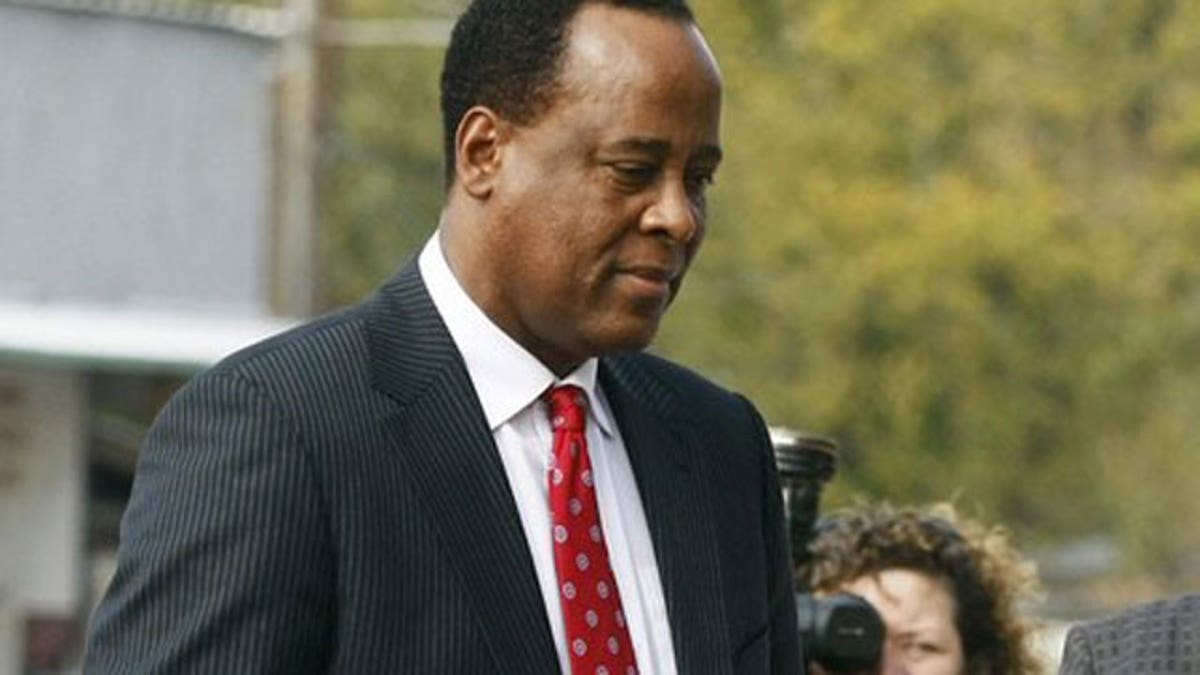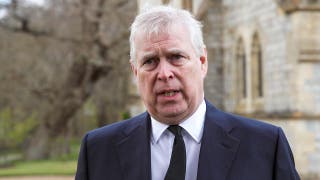
Michael Jackson's doctor has been taken into custody and is being held on $75,000 bail after pleading not guilty to causing the pop star's death.
Dr. Conrad Murray, a Houston cardiologist who was with Jackson when he died June 25, entered his plea Monday in Los Angeles Superior Court, just a few hours after he was charged with involuntary manslaughter.
Superior Court Judge Keith L. Schwartz set Murray's bail at $75,000, three times more than what most people charged with involuntary manslaughter face. Prosecutors had been seeking $300,000 bail for Murray, who was taken into custody by sheriff's deputies but not handcuffed in public.
The judge told Murray when he posts bail he may travel throughout the United States but may not leave the country. He must also surrender his passport.
Murray, a cardiologist who was with Jackson when he died June 25 at his rented Los Angeles mansion, is accused of acting "unlawfully and without malice" in bringing about Jackson's death, according to a complaint filed by prosecutors.
The complaint said Murray acted "without the caution and circumspection required" when he administered a powerful sedative to Jackson in an effort to help him sleep. If convicted, Murray faces as much as four years in prison.
SLIDESHOW: Conrad Murray Visits Jacko's Tomb
Soon after the charge was filed, Jackson's mother and father, his brother Jermaine Jackson, and other family members arrived in a fleet of Cadillac Escalades at the courthouse adjacent to Los Angeles International Airport, where hundreds of reporters and Jackson fans were gathered outside.
"Looking for justice," was all Jackson's father, Joe Jackson, had to say as he walked past a crowd of reporters and into the courthouse.
LIVESHOTS: Fox News' Adam Housley Is Live at L.A. Courthouse
Jackson, 50, hired Murray to be his personal physician as he prepared for a strenuous series of comeback concerts in London. Officials say the singer died after Murray administered the powerful general anesthetic propofol and two other sedatives to get the chronic insomniac to sleep.
Known as "milk of amnesia," propofol is only supposed to be administered by an anesthesia professional in a medical setting because it depresses breathing and heart rate while lowering blood pressure.
The American Society of Anesthesiologists warned in 2004 that a doctor using propofol should have education and training to manage anesthesia complications, be physically present throughout sedation and monitor patients "without interruption" for signs of trouble. Rescue equipment "must be immediately available," it said.
Click here to read the charges.
Los Angeles investigators were methodical in building a case against Murray, wary of repeating missteps that have plagued some other high-profile celebrity cases, most notably O.J. Simpson and actor Robert Blake, both of whom were acquitted of murder.
After reviewing toxicology findings, the coroner ruled Jackson's death a homicide caused by acute intoxication of propofol, with other sedatives a contributing factor.
Murray appears to have obtained the drug legally and its use is not in itself a crime. To show the doctor was negligent in his care, detectives spoke to more than 10 medical experts to see if his behavior fell outside the bounds of reasonable medical practice.
According to court documents, Murray told police he administered propofol just before 11 a.m. then stepped out of the room to go to the bathroom.
There is some dispute about what happened next. According to court filings, Murray told police that upon his return from the bathroom, he saw Jackson was not breathing and began trying to revive him.
But an ambulance was not called until 12:21 p.m. and Murray spent much of the intervening time making non-emergency cell phone calls, police say. The nature of the calls, which lasted 47 minutes, is not known.
Murray's lawyer has said investigators got confused about what Murray had told them, and that the doctor found his patient unresponsive around noon.
The investigation included several agencies, including the Los Angeles Police Department, the district attorney's office and the federal Drug Enforcement Administration.
A large number of witnesses has been interviewed by police, including those who were present during Jackson's last days, those who worked with him in preparation for his series of comeback concerts, "This Is It," and members of his personal entourage, including his security guard and personal assistant.
Murray, who has a practice in Houston, became Jackson's physician in May. An executive of concert promoter AEG Live has said Jackson insisted Murray be hired to accompany him to London.
The concerts sold out in anticipation of Jackson's return as the "King of Pop" after years of odd behavior, trial and acquittal on molestation charges and self-imposed isolation that overshadowed a lifetime in music that reached superstardom with the 1982 album "Thriller" and such hits as "Beat It" and "Billie Jean."
At the time of his death, Jackson was in relatively good health and had no illegal drugs in his system, according to the autopsy report obtained by The Associated Press. Jackson had a strong heart and his kidneys and most other major organs were normal, according to the autopsy.
Jackson's most serious problem was a chronic inflammation of the lungs that reduced capacity and may have left him short of breath. But the autopsy said it would not have been a direct or contributing cause of death.
Legal experts said the autopsy findings bolstered the case for prosecution and would block a potential defense that Jackson hid serious conditions that increased risk of death from drugs he willingly took.
Click here for more photos of Dr. Conrad Murray at the tomb of Michael Jackson last month.














































